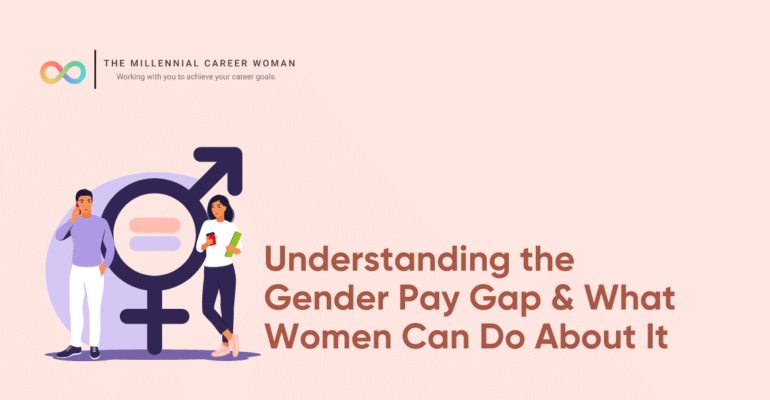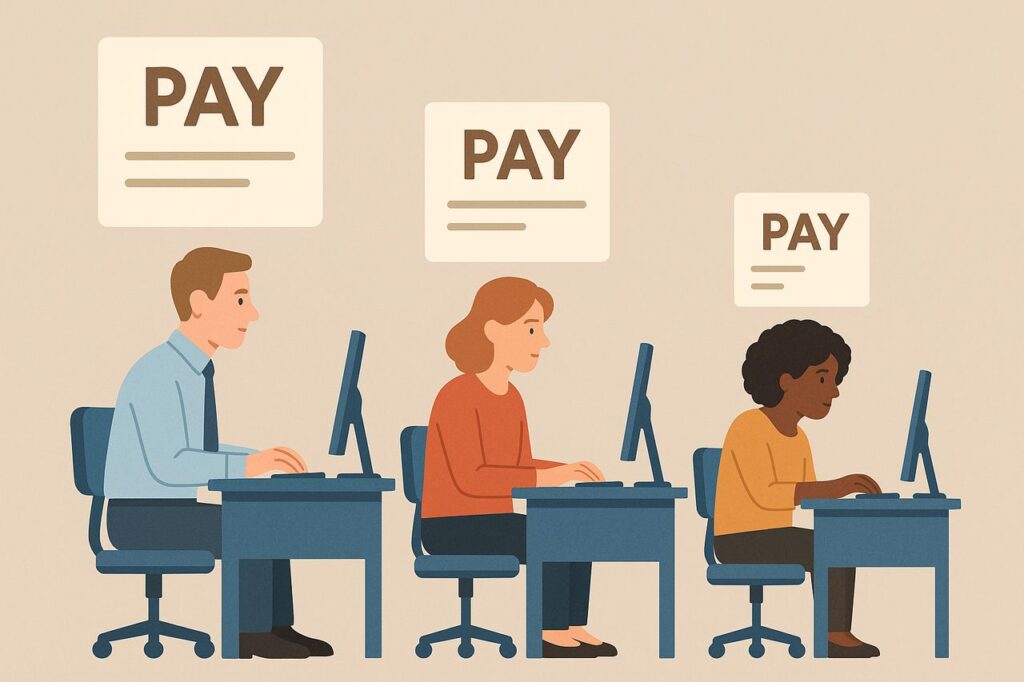Understanding the Gender Pay Gap & What Women Can Do About It

Understanding the Gender Pay Gap & What Women Can Do About It
When I first started job hunting, I didn’t know much about negotiating my salary. Honestly! I was just grateful whenever I got an offer. Whatever number came through, I’d smile, say thank you, and accept it, no questions asked.
Looking back now, I can’t really fathom how much I must have left on the table. But I also know I’m not alone in that experience and it is estimated that women lose over a 1 million in lifetime earnings by not negotiating their salary.
But here’s the thing: your skills, experience, and impact deserve proper compensation. And understanding the gender pay gap is the first step to changing that.
What Exactly Is the Gender Pay Gap?
The gender pay gap refers to the difference between the average earnings of men and women across the workforce but it’s also about how opportunities, promotions, and access to high-paying roles are distributed.
It’s about patterns—who’s in leadership, who’s climbing the ladder, and who’s stuck doing the same role for years at the same pay.
State of the Gender Pay Gap in the UK
In December 2024, the UK government’s Valuation Office Agency (VOA) released its Gender Pay Gap Report, revealing a mean gender pay gap of 6.4%, in April 2024, down from 7.5% in 2023 and while these figures indicate progress there is still a long way to go. PwC estimates it could take 45 years to close the UK’s gender pay gap.
Studies from the National Statistics (ONS) shows that the gender pay gap is more pronounced among employees over 40, with a gap of 9.1% for those aged 40 to 49, compared to 4.4% for those aged 30 to 39. Additionally, higher-paid employees experience a larger gap; for instance, managing directors and senior officials saw the gap widen from 9.2% in 2023 to 9.8% in 2024.
To effectively close the gender pay gap, the UK government needs to address underlying challenges such as historical inequities, occupational segregation, biases, and budget constraints. However, women cannot afford to wait for systemic changes to take effect. In the following sections, we will explore actionable strategies that women in the UK job market can employ to advocate for themselves and work towards achieving pay equity.

Practical Steps to Address the Gender Pay Gap
1. Know Your Worth with Accurate Data
One of the first things you can do is gain a clear understanding of where you stand in comparison to the broader market. Gender pay gaps vary by industry, job role, and even geographic location. For instance:
- The overall gender pay gap in the UK stands at 15.4%, but in sectors like tech, it can be as high as 21%
- Women in leadership positions, particularly in finance, earn 27% less than men.
Knowing these statistics can be empowering and by researching specific salary data for your role, industry, and location, you can better gauge whether you’re being paid fairly. Platforms like Glassdoor, PayScale, and industry reports are great resources for this information. Armed with this knowledge, you can begin building a stronger case for equal pay.
2. Use Pay Transparency to Your Advantage
The recent trend toward pay transparency has made it easier for women to assess where they stand in relation to their peers.
- Pay attention to salary bands in job listings, as many companies are now required to disclose these ranges upfront.
- Where possible, be open about your salary with your peers, this is how you can truly assess if you’re being underpaid.
- Review the gender pay gap reports from your company and industry (In the UK, businesses with 250 employees or more are legally required to report their gender pay gap. This transparency is invaluable when advocating for yourself.).
If your employer or potential employer has publicly shared salary ranges, use this data during salary negotiations to ensure your request is aligned with the market rate.
3. Frame Negotiations as Collaborative
Instead of demanding a raise, position your request in a way that emphasizes mutual benefit. For example, say, “Given my contributions and the current industry standards, I believe a salary adjustment would better reflect my role and value within the team.”
4. Focus on Your Unique Contributions and Achievements
During salary discussions, it’s essential to highlight the specific contributions you’ve made to your company or organization. Consider these strategies:
- Quantify Your Impact: Talk about how your work has directly impacted the company’s bottom line. For example, “I led the delivery of project xyz that delivered a 20% increase in sales” or “I led a team that streamlined our operational processes, reducing costs by 15%.”
- Focus on Leadership and Initiative: Highlight instances where you’ve taken initiative or led key projects that contributed to company success.
By framing your value in terms of measurable results, you can better demonstrate that your compensation should reflect the impact you’ve had.
5. Don’t Forget About Non-Salary Benefits
While salary is important, there are other components of compensation that can make a significant difference in your overall satisfaction and financial well-being. If an employer is unable to meet your salary expectations, consider negotiating for other benefits that could be valuable:
- Flexible working conditions: Work-from-home options or flexible hours can improve your work-life balance.
- Extra paid leave: An additional week of paid vacation can be an attractive benefit.
- Professional development: Ask for training or certifications that will further your career and earning potential.
These benefits can have a significant impact on your well-being and career growth, even if the salary offer isn’t exactly what you expected.
6. Utilize Networking and Mentorship
Building a support network of mentors and colleagues can be invaluable when navigating salary discussions. Seek mentors who can offer guidance, share their own salary negotiation experiences, and help you strategize for upcoming discussions. Additionally:
- Attend industry events, workshops, and conferences where you can connect with other women who can provide insights and advice.
- Use online platforms like LinkedIn to join professional groups focused on gender equity in the workplace.
These connections can provide you with tips and strategies that will help you negotiate more effectively and increase your confidence in these conversations.
7. Practice Your Negotiation Skills
Negotiation like every skill, improves with practice. Before entering a salary discussion, it’s essential to feel prepared and confident. Here are a few ways to boost your negotiation abilities:
- Role-play: Practice with a friend or mentor who can simulate the negotiation process and provide constructive feedback.
- Review Key Talking Points: Focus on your value, the salary data you’ve gathered, and the benefits you bring to the table. Being clear on these points will help you stay confident during the conversation.
The more you practice, the better equipped you’ll be to handle salary discussions in the future.
Final Thoughts
The gender pay gap may be structural, but your power is personal. Every time you advocate for yourself, you also raise the bar for the women coming behind you.
So, here’s your challenge: Don’t just accept the number, ask for what you’re worth.
Please share in the comment section your experience with salary negotiation. Let’s chat and for additional resources, check other resources.

